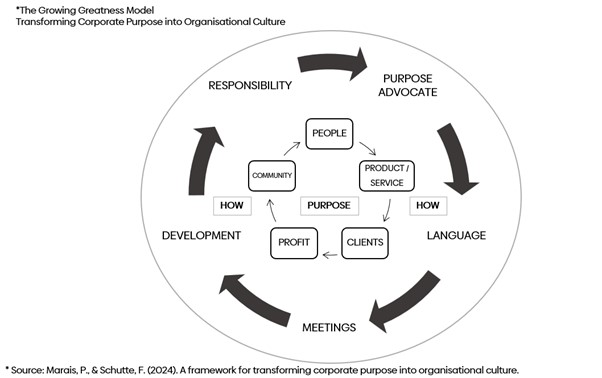
Organisational purpose is becoming one of the most powerful and talked-about approaches in modern business management. When embedded in strategy, it boosts employee engagement, unlocks human potential, ignites passion, and enhances financial performance. In fact, purpose-driven companies consistently outperform the market, by 42%, proving that integrating purpose into strategy is a smart business move.
However, despite its acclaim as the cornerstone of sustainable success, 90% of purpose-led strategies stumble during implementation. Here, we delve into why these strategies often fail and what can be done to turn purpose into action.
The concept of organisational purpose encompasses a reason for existence beyond financial gain. Deloitte’s identifies, “Our definition of purpose is an organisation’s explicit drive to create value beyond profit, specifically for our planet and the people on it.” It involves a commitment to positive societal impact, environmental stewardship, and the well-being of employees, customers and communities. This holistic approach is gaining traction as a purpose-driven organisation not only achieves long-term success but also creates value for all stakeholders, fostering a resilient, adaptable, and innovative business environment.
Despite the clear benefits, embedding organisational purpose into a company’s culture and operations remains a formidable challenge. Often due to a disconnect between intention and action. This gap underscores the need for a systematic framework to translate purpose into everyday practices.
So, what should a CEO and her/his leadership team know about organisational purpose:
1. Research shows us that the purpose (‘deep self’) of an organisation cannot be defined or even implemented, in the absence of defining the individual purposes (‘deep self’) of its leadership. From the work of Marinčič and Marič (2018), we know that an organisation can only ever be as conscious as its leader. So, central to the successful implementation of organisational purpose is conscious leadership. Leaders must align their personal consciousness with the company’s purpose, necessitating a willingness to undergo continuous growth and development. This is best achieved through executive coaching, which provides leaders with the tools and insights to embody and drive purpose-driven initiatives effectively.
2. To bridge the gap between defining purpose and actualising it, companies need a robust framework. The Growing Greatness model*, for instance, offers a comprehensive approach to transforming corporate purpose into organisational culture and behaviours. This often involves consistent communication, rituals, and transformative ‘game-changers’ that embed purpose into the fabric of the organisation. The framework operates from the inside out, with purpose at its core, surrounded by two virtuous cycles and supported by recurring rituals.

3.Purpose is embedded deeper into the culture of organisations when there is a high awareness of the purpose statement and when there is evidence that purpose is translated into action. This means that organisations should strive to have a clear and explicit understanding and expression of their purpose and ensure that it is actively implemented throughout the organisation.
4. Executive alignment to purpose is crucial for the implementation of purpose into the culture of an organisation. When the executive leadership team is aligned with the organisational purpose, there is a higher level of delivery against the purpose statement.
So, for organisations committed to this transformative journey, the first step is a candid evaluation of their current alignment with their stated purpose. Are leaders prepared to embrace a broader vision that integrates purpose-based objectives alongside profit goals? This introspection is crucial for setting a solid foundation for change.
In an era where the inadequacies of profit-focused strategies are increasingly apparent, the shift towards purpose-driven business models is both timely and necessary. As we navigate post-pandemic recovery, the organisations that thrive will be those guided by a clear, compelling purpose that resonates with all stakeholders.
Lidia Ranieri, ECI Partners, July 2024
To connect with us about executive coaching please contact us here.


